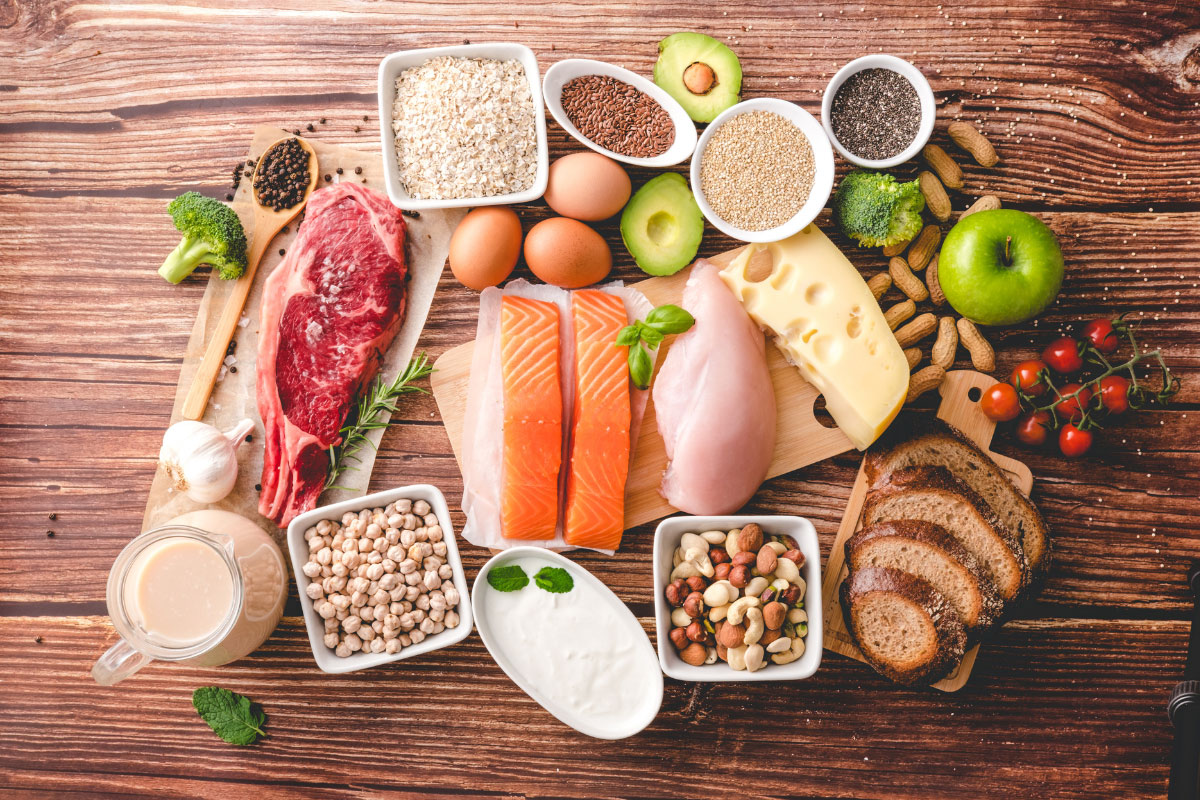Carbs vs Protein: Finding the Right Balance for Your Diet

Creating Your Ideal Macronutrient Mix
Health experts are constantly coming up with ideas that will see the perfect merge of two of the most important macronutrients that our bodies depend on – carbohydrates and proteins. Even if you increase or decrease the quantity of your food portion, if you don’t categorically increase or decrease the amount of carbs and proteins in them, you are not going to see the desired results you are working for.
Macronutrients play a vital role in determining the growth and development of your body. Although many people equate macronutrients with calories, the difference lies in the source of the calories. For centuries, our forefathers have been conceptualising the art of a balanced diet to remain active and stay fit.
Striking the perfect balance will aid in solving major health issues and help you avoid life-threatening ailments. But yes, the job is easier said than done, especially in the fast-paced world we live in where we barely give time to think about what we are putting on our plate. This is why, having introspection about the same is important.
Understanding Carbohydrates
Simple Carbs v/s Complex Carbs
We get our carbs from sugars, starches, and fibers, which are digested and metabolised differently. This also gives an easier explanation of the two distinct types of carbs that we know of – simple and complex.
The more sugar content your carb has, the easier, or rather simpler, it is to digest. On the other hand, the fibers are complex by nature and hence require more time for digestion and you need to balance both of them.
Carbs as an Energy Source
Most carbs are turned into glucose that is stored in the form of glycogen in your muscles and liver. They, in turn, serve as the major source of energy your body relies upon for exercising and other allied intense activities throughout the day.
Usually, within an hour or two, most of the carbs are changed into sugar, which then enters your bloodstream to help raise the blood sugar level. This results in your pancreas producing insulin.
Daily Recommended Intake of Carbs
For an average person, it is suggested that 45-55% of your calories should come from carbs. This means that if you are consuming 2,000 calories everyday, your carbs should make 900-1300 of it, which roughly translates to 225-325 gm of carbs per day.
Exploring Protein
Role of Protein in the Body
For all the muscle enthusiasts out there, protein is your friend. So, there is a reason why you see people hanging out in the gym with a protein shake in their sippers. Proteins are your muscles’ building blocks. A major source of amino acids, they help in nutrient absorption. Apart from building and recovering your muscles, they also help in strengthening your immune system.
Animal-based v/s Plant-based Protein
Depending on your lifestyle and choices, you can pick between either of the two sources of protein – animal or plant-based. Proteins derived from animals contain all nine essential amino acids and are therefore called complete proteins. On the other hand, apart from soybeans and pea protein, almost all other plant-based protein lacks one or more amino acids, making them incomplete proteins.
Satiety Factor of Protein
Protein also plays a major role in satiating you. It helps in making you feel fuller, thereby stopping you from eating more than you should. It does so by stimulating the greater appetite-suppressing hormone in your gut. As such, it helps in weight management.
Daily Recommended Intake of Protein
When it comes to the daily intake of protein, it is recommended that around 20-30% of your total calories should be derived from proteins. This means that if you are consuming around 2,000 calories a day, then 200-700 of those calories should be sourced from protein; irrespective of whether they are animal-based or plant-based. It translates to 50-175 gm of protein everyday.
Assessing Your Nutritional Needs
Factors Influencing Your Macronutrient Requirements
There are several factors that play a major role in determining the macronutrient quantity you need. It is extremely subjective and differs from person to person. This is why just blindly following someone else’s dietary chart is never a bright idea. What worked for them may not necessarily work for you. Yes, you can get a rough blueprint on the protein and carb quantity, but at the end of the day, it should always fall upon several other factors for personalizing your diet.
Some of the key factors in determining your macronutrient intake are sex, age, activity level, present weight, health conditions, and muscle mass. Additionally, if you are pregnant, that should also be taken into consideration. Our customized meal plans take care of your specific needs as per your body’s requirements.
Calculating Your Daily Carb and Protein Needs
If you want to live healthily and make sure that you stay healthy through your old age, it is wise to start making conscious health choices early on. The sooner you begin, the more benefit you will derive as you age. And one major activity in it is tracking the amount of macronutrients daily.
Since we are speaking of carbs and protein here specifically, here is how you need to calculate their breakdowns. However, fats also comprise a major third of the overall macronutrient. So, while figuring out the first two, you eventually will find answers to the quantity of fats as well.
Now, considering the following equations, you need to derive the macronutrient intake.
- 1 gm of carb = 4 calories
- 1 gm of protein = 4 calories
- 1 gm of fat = 9 calories
If you are assorting 45% of your calories from carbs, 25% from proteins, and the rest 30% from fats, and overall consuming 2,000 calories, then this is how the breakdown should be.
- Carbs: 45% x 2,000 calories / 4 calories = 225 gm
- Proteins: 25% x 2,000 calories/ 4 calories = 125 gm
- Fats: 30% x 2,000 calories/ 9 calories = 67 gm
Customizing Your Diet Based On Personal Preferences
It is no secret that the more you personalize your diet, the quicker and more efficient results you will notice. This is because a personalized diet helps in targeting the key factors in you and addresses them at their core. When your diet is built around your health conditions and health goals, you give yourself better odds at meeting the desired objectives.
So, whenever you are picking up a diet, don’t forget to personalise it further down the line by tweaking a factor or two to make it resemble your lifestyle as much as possible. Now remember, in your attempt to customising your diet, there are certain factors you need to pay attention to.
First, you have to decide how many meals in a day you will be consuming – three heavy meals, five moderate medals, or eight short meals. Next, how much time you are allotting to preparing your food? Finally, what is your activity level going to look like other than the average daily activities? Will you take part in exercises, running, swimming, and other allied activities or not? Finding the answers to these and discussing them with a nutritionist will help you in personalising your diet better.

Finding the Right Balance
Balancing Carbs and Protein for Weight Management
If you are managing your weight, then you need to be cautious about your carbs and protein intake. It heavily depends on where you currently are with the state of your weight. Are you trying to lose weight, are you trying to gain weight, or are you simply trying to maintain the present weight that you have?
Well, if you are trying to maintain your weight, then you don’t have to change a lot of what you are presently doing since whatever you are doing is working for you. But still, try to maintain the aforementioned assortment of percentages for carbs and protein in your diet.
As for those who are trying to lose weight, you can decrease their calorie intake by 10-20% while those who are trying to gain weight can increase their calorie intake by 10-20%.
Optimizing Macronutrient Ratios for Performance
Macronutrient plays a pivotal role in enhancing your athletic performance by boosting your muscle growth and providing you with the required energy during exercises, especially for those who participate in longer and more intense workout sessions.
The Role of Carbs and Protein in Muscle Recovery
When you combine carbs with protein powder before you head out to workout, you give your body the necessary energy boost it needs. It derives the energy due to the release of glucose from carbs and amino acids from protein. This increases your endurance and eventually prevents any muscle breakdown that you might experience during high-end workout sessions.
Immediately after a workout session, you need to fuel yourself with carbs. Throughout the day later, you need to supply your body with protein. This will help you in muscle recovery and in reaching health goals.
Dealing with Carb-Cravings
Staying on Track during Special Occasions
Having cravings is extremely natural and you shouldn’t feel too guilty about having a cheat day once in a while. They will give you the motivation to keep going for the next set of days. As long as you have them sparsely and only on special occasions and do not give in to your cravings on your non-cheat days, you are doing fine. After all, celebrating once in a while is perfectly healthy.
However, if you find yourself too distracted to curb your cravings, there are certain routes that you can take. First of all, consume high-fiber carbs such as lentils, beans, edamame, whole-wheat pasta, quinoa, and chickpeas. Try to cut out white bread, pancakes, tortillas, and other white grains and simple sugars from your diet.
Look for more lean protein such as shellfish, tofu, poultry, and eggs and non-starchy vegetables such as spinach, asparagus, green beans, and broccoli. Try and minimize your stress levels by taking a walk in the garden or listening to a relaxing podcast or sipping on a warm tea while enjoying your television shows.
Meeting Protein Needs on a Plant-Based Diet
For those who are looking to get their protein from plant-based sources, the first order of business is to slightly increase the protein intake than you will for animal-based sources. This is because most of the protein that is derived from plants is incomplete proteins as they lack one or more amino acids in them. So, increasing the quantity of plant-based protein helps in maintaining the perfect balance.
Rely on peanuts, tofu, beans, lentils, chickpeas, soybeans, pea protein, tempeh, and other high-end beverages such as pea protein milk and soy milk. You need to ensure that you are having at least three servings of these foods throughout the day to give yourself an adequate amount of protein.
Summing Up
Striking the perfect chord of balance between the two macronutrients – carbs and protein – can be tricky and for most people, it is a continuous process of trial and error. Don’t give up if you don’t immediately see the results. Consult with a dietician so that you develop a better awareness of your body and which route you should take to reach your ultimate health goal.
Maintaining the aforementioned quantity of carbs and proteins will help you in weight management, muscle building, and recovery, and will also provide you with the energy you need to go about your daily activities.
Frequently Asked Questions
Some of the more commonly asked queries
Are carbs or protein better for exercise?
Ideally, you should balance both carbs and proteins before a workout because the glucose released from carbs and the amino acids released from protein will help you keep up with the vigorous activities you are about to go through during exercises. If you don’t consume carbs, then the protein will be burned as an energy source and you will not be able to build lean muscles from it.
What burns faster carbs or protein?
Our bodies are built in a way that it burns carbs the quickest. Proteins are only burned when both the carbs and fats have been depleted. This is because proteins are made from complex molecules and take a long time to break down.
What happens if you eat too much protein but low calories?
When you consume too much protein without appropriately increasing the amount of overall calories, then you tend to lose weight. This is why it is not recommended for those who are looking to build muscles as almost all the protein content will be burned instead of being used to build muscles.
